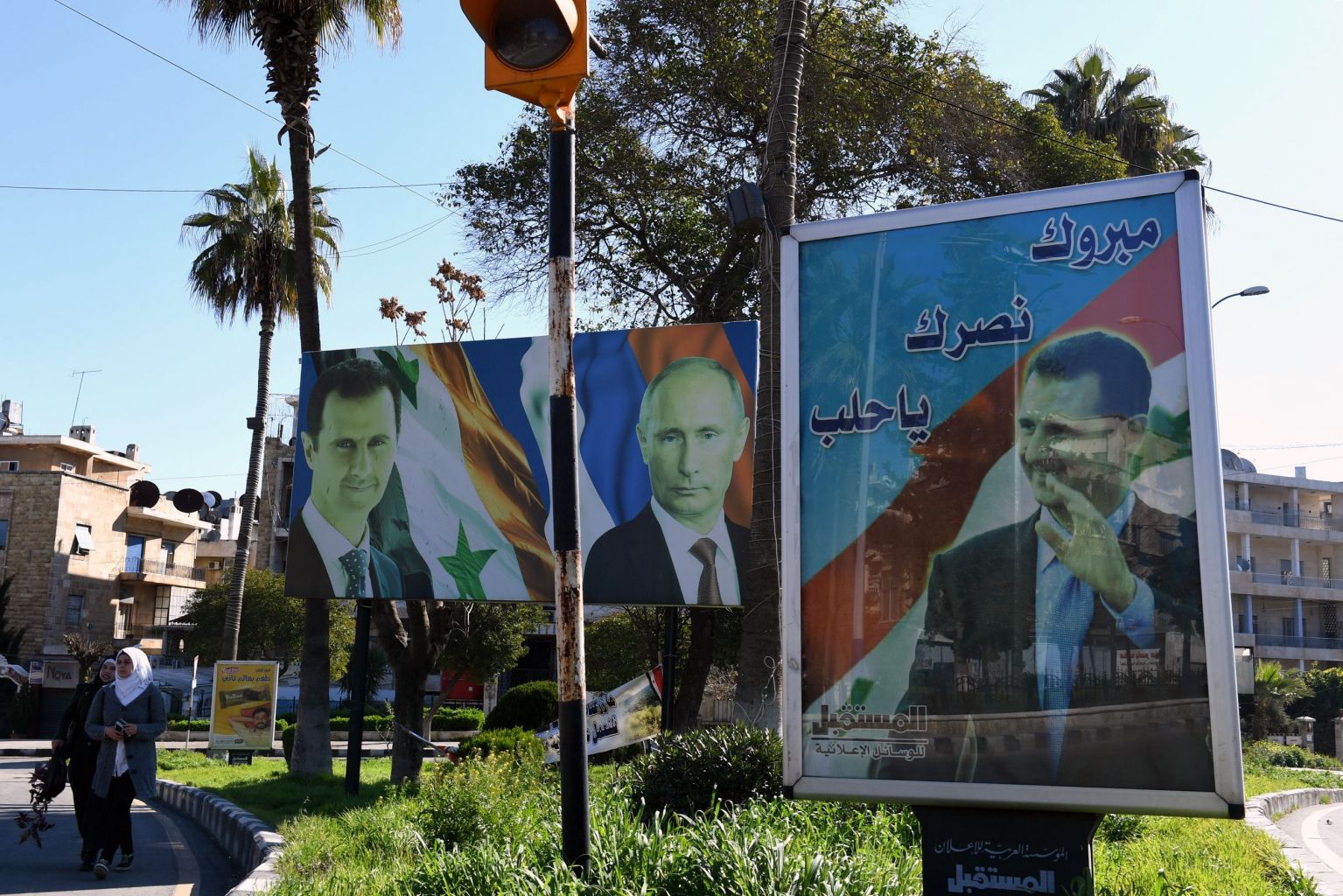Wagner Group: The mercenaries serving Putin in Syria
Sign up now: Get ST's newsletters delivered to your inbox

Portraits of Russian President Vladimir Putin, Syrian President Bashar al-Assad and Lebanese Hezbollah Leader Hassan Nasrallah hang outside a jewellery shop Aleppo on March 17, 2018.
PHOTO: AFP
Follow topic:
MOSCOW (AFP) - The deaths of several members of the so-called "Wagner Group" in Syria last month shone a light on Russian President Vladimir Putin's mysterious private army Moscow is using there.
Questions had already been raised on its role in the Syrian conflict and intensified when Washington said on Feb 7 it had killed at least 100 pro-regime troops in Deir Ezzor.
After days of silence, Moscow acknowledged five Russian nationals were killed and "dozens" wounded in the attack, saying they all were in Syria "on their own initiative".
Various media outlets have reported up to 200 fatalities and the group of Russian investigative bloggers known as the Conflict Intelligence Team (CIT) has established the identities of dozens of them - all members of the Wagner Group.
"Wagner can and should be regarded as Russia's shadow army in Syria, as it has been providing the vital frontline component to Russia's operations in Latakia and Eastern Syria," CIT's Kirill Mikhailov told AFP.
The group played an important role in the retaking of Palmyrah from the Islamic State in Iraq and Syria (ISIS) group, which had controlled the city since March 2016, he added.
Mr Pavel Baev, an associate research fellow at the French Institute of International Relations, said Russia's resort to "shadow armies... has the double benefit of ensuring deniability and discounting casualties".
But "the problem with assets like the Wagner Group is that they are never fully controllable and could become maverick", he said.
The group's "capabilities exceed any Western private military company by far", said Mr Mikhailov.
Wagner was set up by former Russian military intelligence officer Dmitry Utkin, who was part of the first convoy of Russian mercenaries sent in autumn 2013 to Syria.
But their ill-equipped mission, which did not have the backing of the Russian authorities, ended in fiasco.
They engaged in some combat with the ISIS but rapidly returned to Russia, where two backers of the scheme were jailed for three years for mercenary activities.
In June 2014, Mr Utkin joined the ranks of pro-Russian separatist forces in eastern Ukraine - the Wagner Group's birthplace - according to official reports from Ukraine.
The Kremlin has continuously rejected accusations from Kiev and the West of its military presence in Eastern Ukraine, saying the Russians who are fighting there are "volunteers".
Mr Utkin reappeared in Syria in autumn 2015, when Russia launched an intervention in support of Kremlin ally and Syrian President Bashar al-Assad's regime.
In December next year, the former intelligence officer showed up at a televised ceremony held in the Kremlin to honour "the Heroes of Fatherland" and was the same day photographed alongside Mr Putin.
Various media reports in Russia and the United States said Wagner is being funded by one of Mr Putin's allies, Mr Evgeny Prigozhin, a Saint Petersburg businessman who made a fortune in the catering business before signing lucrative contracts with Russia's military and the government.
He has been charged by a US court with setting up an Internet "troll factory" that attempted to influence the 2016 American presidential election in favour of Donald Trump.
The number of Wagner's fighters in Syria has been the subject of debate by analysts and media, with Republic.ru online magazine reporting the presence of 2,500 mercenaries in March 2016.
It said US$350 million (S$460.52 million euros) had been spent on mercenaries since the operation began.
Wagner's mission "is essentially a failure", a former member of the group told Russian Sovershenno Sekretno weekly.
He said 40 per cent of recruits had been jailed for serious crimes before they joined Wagner and would refer to each other as the "unlucky ones".
This "low-quality" of recruits, along with the idea that Wagner functioned as an autonomous army and accepted missions from non-Russian groups, led to rising tensions with officials both on the ground in Syria and in Moscow's corridors of power.
In early 2016, the group lost the trust of - and financing from - Russia's Defence Ministry, according to various reports.
This led "Prigozhin to seek other contracts, such as the one with Damascus whereby Wagner would liberate oil and gas fields and infrastructure in exchange for 25 per cent of production", he added.
To this end, he established a company named Evro Polis, which signed the contract with Mr Assad's government in December 2016 and is now responsible for paying Wagner mercenaries' salaries that vary from an estimated US$3,500 to US$5000 a month.
"Most probably, Prigozhin's companies provide a hub that channels the funding coming from other sources, including the Syrian government," said analyst Baev.

